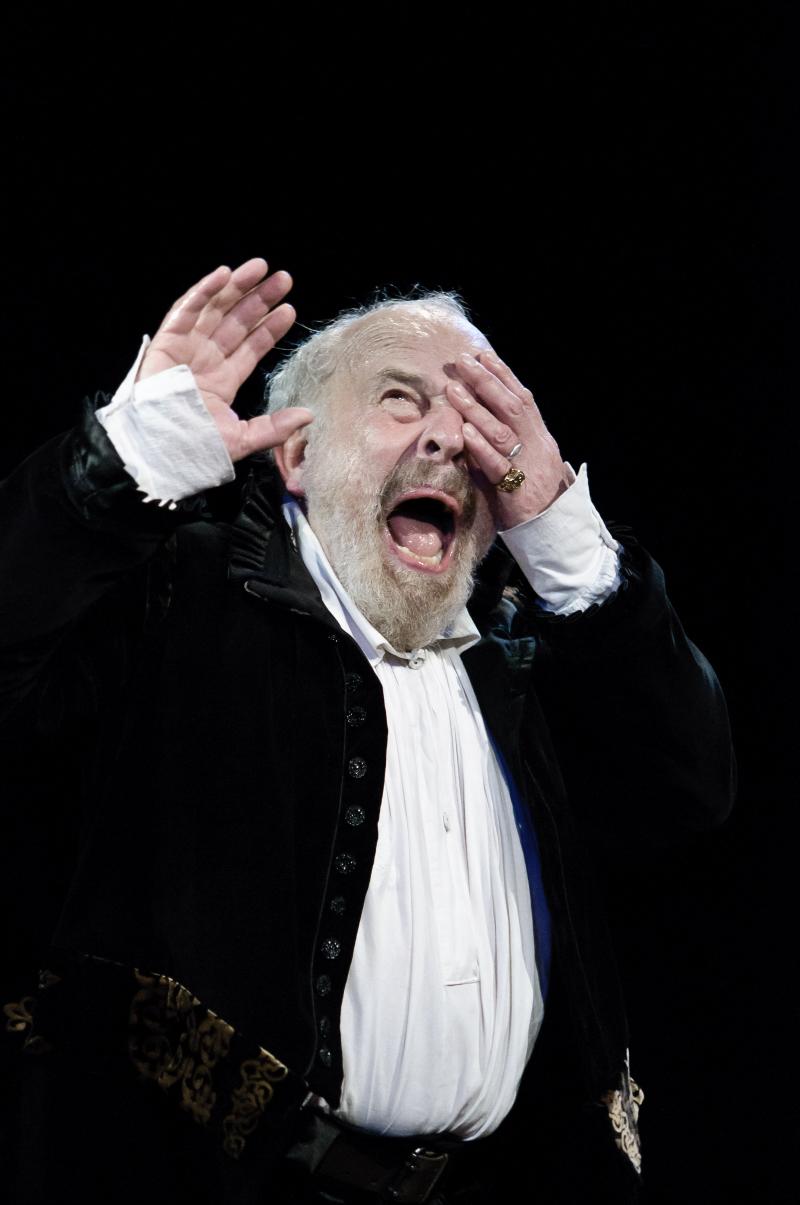King Lear, Tobacco Factory, Bristol | reviews, news & interviews
King Lear, Tobacco Factory, Bristol
King Lear, Tobacco Factory, Bristol
A traditional Lear triumphs in the heat of Bristol's alchemical vessel

King Lear was the play that launched Shakespeare at the Tobacco Factory 12 years ago. The company, under the inspired artistic direction of Andrew Hilton, opened its 2012 season with a brand new production that displays all the qualities that have made this remarkable company unique in Britain.
The strength of all the shows has always drawn on the special atmosphere and architecture of the building. The theatre space at the Tobacco Factory is not just in the round. It is so small and relatively low-ceilinged that actors and audience are drawn into an alchemical vessel which Andrew Hilton has, over the years, refined into a tool which delivers a rare experience: proximity engenders an almost uncanny transmission of energy between the players and those they perform to. There is no need to pander to the gallery here, as emotions pass directly, with an immediacy that conventional proscenium arch divisions cannot deliver.
It is surprising to see the characters’ Elizabethan costumes suddenly shift into a post-modern mix of more contemporary styles
The qualities of the space are ideally suited to the stripped-down style of Hilton’s productions, an approach that works from and through the text. There has never been much need for the Bristol-based director to re-invent the plays or soup them up for the 21st century. Once again, in this new production of Lear, all the actors speak the words with the clarity that comes from a deep understanding of the play’s essence. Much of the play, driven as it is by anger and despair, is delivered at high fever pitch, but only in the storm, with the clatter of thunder and the howling wind are a few words obscured.
 John Shrapnel (pictured left) brings to the doomed King the wisdom of an older actor who has, I suspect, first-hand experience of the shadows of ambition and the hell that comes from taking wrong turns. He plays the twists and turns of an ego’s voyage into annihilation with sensitivity and a nuanced expressive range that makes the man’s descent into hell totally believable.
John Shrapnel (pictured left) brings to the doomed King the wisdom of an older actor who has, I suspect, first-hand experience of the shadows of ambition and the hell that comes from taking wrong turns. He plays the twists and turns of an ego’s voyage into annihilation with sensitivity and a nuanced expressive range that makes the man’s descent into hell totally believable.
The rest of the cast do more than support, Hilton produces ensemble work in which every character shines. Simon Armstrong, as Kent, conveys the character’s deep humanity in a palpable way, free of cliché. Julia Hills expresses Goneril’s mixture of psychopathic scheming and chronic insecurity with chilling deftness, though she is a little too middle-aged for the part of a woman whose father curses her with barrenness. Regan is an altogether cooler customer, who spits out venom with no hint of an afterthought, and Dorothea Myer-Bennett produces a tempered yet no less disturbing contrast to her sister's more obviously unhinged behaviour. As her husband, the Duke of Cornwall, Byron Mindahl navigates the character’s descent into evil with a scary hint of camp and his expression of horror mixed with blood-lust after plunging his fingers into Gloucester's eyes is awe-inspiring rather than needlessly over-the-top.
King Lear is as rich as any of Shakespeare’s tragedies. The play is not alone in dealing with the contrast between the so-called civilised court and the wild state of nature outside the city walls. Hilton’s production catches this dichotomy well and exposes its paradoxical nature, along with the relative value of what we call madness. There is a strong earthiness about the performance, a recognition of the incestuous relationship between power, violence and sexuality, expressed in the physicality of the acting, all of which packed a greater punch through being performed in such a contained space. The actors are almost too close for comfort but this is a play that doesn’t stick to the comfort zone. It suggests instead that the zone is illusory, with only a thin veneer of civility masking the fierce and frightening realities below.
Andrew Hilton has always stated very strongly that he won't be tempted by gratuitous updating. It is surprising therefore to see the costumes, which had until then been strictly Elizabethan, shift uneasily, in the play's dénouement, into a post-modern mix of more contemporary styles, with the odd historical reference. When Kent finally returns at the end of the play, he alone wears full Renaissance court costume, as some time-traveller out of Doctor Who. If there's a reason, it isn't clear. By shifting the audience's focus at the moment of climax, when emotion should be paramount, the full impact of this otherwise outstanding production's tragic resolution is temporarily undermined rather than illuminated.
Watch Shakespeare at the Tobacco Factory rehearsals and interviews with actors and director:
- King Lear at the Tobacco Factory in Bristol until 24 March
rating
Buy
Explore topics
Share this article
The future of Arts Journalism
You can stop theartsdesk.com closing!
We urgently need financing to survive. Our fundraising drive has thus far raised £49,000 but we need to reach £100,000 or we will be forced to close. Please contribute here: https://gofund.me/c3f6033d
And if you can forward this information to anyone who might assist, we’d be grateful.

Subscribe to theartsdesk.com
Thank you for continuing to read our work on theartsdesk.com. For unlimited access to every article in its entirety, including our archive of more than 15,000 pieces, we're asking for £5 per month or £40 per year. We feel it's a very good deal, and hope you do too.
To take a subscription now simply click here.
And if you're looking for that extra gift for a friend or family member, why not treat them to a theartsdesk.com gift subscription?
more Theatre
 Juniper Blood, Donmar Warehouse review - where ideas and ideals rule the roost
Mike Bartlett’s new state-of-the-agricultural-nation play is beautifully performed
Juniper Blood, Donmar Warehouse review - where ideas and ideals rule the roost
Mike Bartlett’s new state-of-the-agricultural-nation play is beautifully performed
 The Gathered Leaves, Park Theatre review - dated script lifted by nuanced characterisation
The actors skilfully evoke the claustrophobia of family members trying to fake togetherness
The Gathered Leaves, Park Theatre review - dated script lifted by nuanced characterisation
The actors skilfully evoke the claustrophobia of family members trying to fake togetherness
 As You Like It: A Radical Retelling, Edinburgh International Festival 2025 review - breathtakingly audacious, deeply shocking
A cunning ruse leaves audiences facing their own privilege and complicity in Cliff Cardinal's bold theatrical creation
As You Like It: A Radical Retelling, Edinburgh International Festival 2025 review - breathtakingly audacious, deeply shocking
A cunning ruse leaves audiences facing their own privilege and complicity in Cliff Cardinal's bold theatrical creation
 Edinburgh Fringe 2025 reviews: Refuse / Terry's / Sugar
A Ukrainian bin man, an unseen used car dealer and every daddy's dream twink in three contrasting Fringe shows
Edinburgh Fringe 2025 reviews: Refuse / Terry's / Sugar
A Ukrainian bin man, an unseen used car dealer and every daddy's dream twink in three contrasting Fringe shows
 Faustus in Africa!, Edinburgh International Festival 2025 review - deeply flawed
Bringing the Faust legend to comment on colonialism produces bewildering results
Faustus in Africa!, Edinburgh International Festival 2025 review - deeply flawed
Bringing the Faust legend to comment on colonialism produces bewildering results
 Edinburgh Fringe 2025 reviews: Imprints / Courier
A slippery show about memory and a rug-pulling Deliveroo comedy in the latest from the Edinburgh Fringe
Edinburgh Fringe 2025 reviews: Imprints / Courier
A slippery show about memory and a rug-pulling Deliveroo comedy in the latest from the Edinburgh Fringe
 Edinburgh Fringe 2025 reviews: The Ode Islands / Delusions and Grandeur / Shame Show
Experimental digital performance art, classical insights and gay shame in three strong Fringe shows
Edinburgh Fringe 2025 reviews: The Ode Islands / Delusions and Grandeur / Shame Show
Experimental digital performance art, classical insights and gay shame in three strong Fringe shows
 Edinburgh Fringe 2025 reviews: Ordinary Decent Criminal / Insiders
Two dramas on prison life offer contrasting perspectives but a similar sense of compassion
Edinburgh Fringe 2025 reviews: Ordinary Decent Criminal / Insiders
Two dramas on prison life offer contrasting perspectives but a similar sense of compassion
 Edinburgh Fringe 2025 reviews: Kinder / Shunga Alert / Clean Your Plate!
From drag to Japanese erotica via a French cookery show, three of the Fringe's more unusual offerings
Edinburgh Fringe 2025 reviews: Kinder / Shunga Alert / Clean Your Plate!
From drag to Japanese erotica via a French cookery show, three of the Fringe's more unusual offerings
 The Two Gentlemen of Verona, RSC, Stratford review - not quite the intended gateway drug to Shakespeare
Shakespeare trying out lots of ideas that were to bear fruit in the future
The Two Gentlemen of Verona, RSC, Stratford review - not quite the intended gateway drug to Shakespeare
Shakespeare trying out lots of ideas that were to bear fruit in the future
 Edinburgh Fringe 2025 reviews: The Horse of Jenin / Nowhere
Two powerful shows consider the Israeli-Palestinian conflict, with mixed results
Edinburgh Fringe 2025 reviews: The Horse of Jenin / Nowhere
Two powerful shows consider the Israeli-Palestinian conflict, with mixed results
 Edinburgh Fringe 2025 reviews: The Fit Prince / Undersigned
A joyful gay romance and an intimate one-to-one encounter in two strong Fringe shows
Edinburgh Fringe 2025 reviews: The Fit Prince / Undersigned
A joyful gay romance and an intimate one-to-one encounter in two strong Fringe shows

Add comment